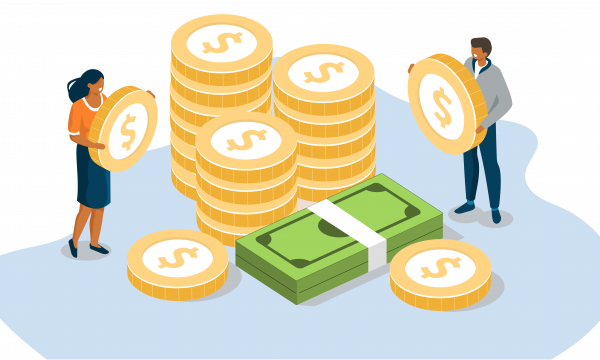Why certificates of deposit (CDs) make sense

So, you have a sum of cash that you don’t need just yet and are wondering what the best place for it might be. There isn’t a shortage of types of accounts in which to park your money, that’s for certain. Too many times, though, we tend to think of accounts in terms of spending, saving, and investing — period. At UBT, we know the savvy consumer shouldn’t overlook the humble certificate of deposit when choosing a place to park your funds. Some call it an investment tool, others call it a savings or deposit account (the word “deposit” is in the name, after all). We just call it smart. Here, we’ll answer some common certificate of deposit questions.
What exactly is a CD?
A certificate of deposit, or CD, is a low-risk, FDIC-insured savings tool that can boost the amount you earn in interest while keeping your money safely tucked away for the amount of time you — the customer — choose. A CD is guaranteed to return both the principal and interest earned at maturity. And while it does have certain parameters, such as a fixed term and early withdrawal penalties, it also offers a higher interest rate than a traditional savings account and makes excellent sense in so many savings situations.
How does it work?
The day you open your CD is the deposit date. You’ll put the funds you want to invest into the CD that has the interest rate and the term length you want. If you want a higher interest rate, you’ll want to choose a longer term; if you want access to your money earlier, choose a shorter term. The amount of funds held in your CD will earn interest at the rate you choose. Once the CD reaches the maturity date — i.e., the date the certificate comes due for payment to you — there is a grace period during which you can withdraw the money you put in plus the interest it earned before the certificate rolls over into the same term at the current interest rate. You can also amend the CD to another term at this point. One important thing to remember with CDs, however, is that there are penalties for early withdrawal outside of the grace period, which are based on the CD’s interest rate.
How would a CD benefit me?
CDs can provide predictable income during uncertain economic times — like during a recession, when other types of investments often lose value. Unlike the stock market and other investment vehicles, which require a degree of risk, money in a CD will grow predictably. Not only do you earn interest, but your principal is safe and will never go down in value.
As we mentioned, your CD will yield a higher interest rate than a “regular” savings account in exchange for keeping it in the bank for the agreed-upon term. And CDs are extremely helpful in planning and budgeting because you’ll know the interest you’ll earn, not to mention how long until you’ll earn it, and can plan accordingly. If you need to earn a specific amount of interest to help cover an upcoming expense, then you can figure out how much you need to invest, using the interest rate as your gauge.
Which term is best?
Typically, the longer the CD term, the higher the interest rate you earn, but there are always exceptions based on your bank’s CD specials.
A short-term CD is a certificate of deposit that has a maturity term of less than one year. The advantage of a short-term CD is that your money isn’t locked in for years. Choosing a short-term CD could make sense if you:
- Are saving for a short-term goal, like living expenses, an emergency fund, or a vacation
- Prefer to “ladder” your CDs (i.e., investing in a variety of CDs from short-term to long-term, so you have funds available at regular intervals)
- Are unsure when you’ll need your funds and want to avoid early withdrawal penalties
A long-term CD is generally a CD with a maturity term ranging from one to five years, although it’s possible to find CDs with even longer terms — your bank’s CD specials are the best place to look for longer term CDs, also. Choosing a CD term of one year or longer usually means being sure you won’t need to the funds in prior to the maturity date. Otherwise, you might face an early-withdrawal fee. Longer-term CDs may be useful if you:
- Want a safe, secure place to keep your savings until you need them
- Are looking for a longer-term investment alternative’
- Have a fully funded emergency fund for your short-term financial needs
What about rising-rate CDs?
A rising-rate CD works a bit differently than a fixed-term CD, giving you the best of both worlds. A favorite among CD fans, these savings powerhouses start out with a predetermined rate for a set number of months (let’s say 15 months). When that term is up, you can withdraw your funds penalty-free, or you can choose to leave the funds where they are for a second term (another nine months, for example) — which is where the real magic happens. Before the CD matures, the interest rate associated with the account increases a predetermined amount on scheduled dates. By leaving your money in the account for the entire time, you’re able to reap the benefits of the rate “rise,” resulting in a pretty nice blended rate of return on your original deposit.
While music CDs may have gone the way of hoop skirts, deposit CDs are alive and well — and are a smart choice in an uncertain economy. Touted by experts as a sound investment, the savvy saver knows that both short- and long-term CDs have a place in their deposit portfolio.
Check out our CD specials today — and stop in to your nearest branch or contact us to get started!
We hope you found some of our tips helpful! This article is part of the Be Prepared principle, part of UBT's Five Principles of Financial Wellness Series.
Learning Center articles, guides, blogs, podcasts, and videos are for informational purposes only and are not an advertisement for a product or service. The accuracy and completeness is not guaranteed and does not constitute legal or tax advice. Please consult with your own tax, legal, and financial advisors.




